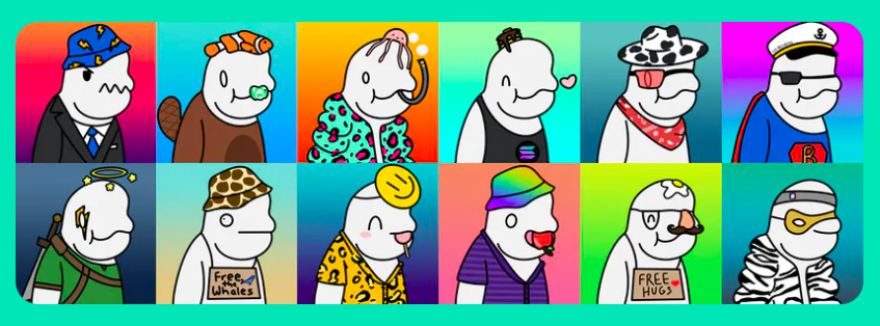Cook Inlet belugas don’t have a lot in common with cryptocurrency, the online dollar that’s becoming increasingly popular around the world.
But a 14-year-old in Puerto Rico is using her digital art, and the online currency, to raise tens of thousands of real-life dollars for beluga conservation in Alaska.
“And we were thinking if this works we could help them," Abigail said. "Because there are only, I think, 279 Cook Inlet belugas right now. And we could really help them out if the NFT works.”
It worked. Last weekend, Abigail flew across the country to hand Girdwood-based Beluga Whale Alliance its largest donation to date — $50,000.
Abigail goes by PeachSunday online and asked us not to use her last name to protect her privacy.
The high school freshman has set records selling her digital illustrations, which she calls “Belugies.” Each colorful piece features a beluga with different accessories, from gold chains to sunglasses to astronaut suits.
But they’re not just illustrations. Abigail’s pieces are NFTs, which stands for non-fungible token. “Non-fungible” means unique, because each NFT is a digital file that’s entirely original and can only have one owner.
It’s a new-ish concept and is complicated by the fact that there’s no physical artwork being exchanged. When you buy an NFT, you’re buying ownership over a digital file. That way, even if everyone on the internet can see it, you’re the only true documented owner. And that ownership in itself is worth something online.
It’s actually worth quite a bit. Her older brother Adam said his sister’s NFTs are selling for big bucks.
“In 10 hours we sold out and we made $1,021,000," Adam said.
If you’re wondering why someone would spend thousands on something they can’t even hold, you’re not alone.
Abigail herself couldn’t believe it when her NFTs sold out. One of them, a beluga in an orca whale suit, sold for over $10,000.
“It changed all of our lives," Adam said. "And we helped save some belugas.”
NFT advocates say people are excited about the prospect of ownership and collecting. Earlier this year, an NFT sold at Christie’s auction house for $69 million.
Abigail thinks people are drawn to the charity aspect of her NFTs, and creating a tangible impact out of something otherwise intangible.

The young artist only started making digital art less than a year ago. Adam was the one who told her about NFTs and she decided to try her hand.
She wanted to draw an animal that would make a cute character. So, she picked belugas.
“Because belugas are super cute, smart, and we loved them ever since the Georgia aquarium that we went to in 2018," Abigail said.
She also wanted to send a cut of her potential proceeds to beluga-focused organizations.
That’s how she found Beluga Whale Alliance online and connected with Suzanne Steinert, its founder and president. Steinert started Beluga Whale Alliance in 2017.
“This is our biggest donation to date and it’s really going to help us get to that next level," Steinert said. We’ve been operating at a pretty grassroots level but this will really help contribute to the sustainability of our baseline operations funding and also scale up our operations, too, to have more of an impact.”
The nonprofit works on conservation efforts for Cook Inlet’s endangered belugas. It’s part of the Beluga Monitoring Partnership, which enlists Alaskans to count belugas on the shores of Cook Inlet to help researchers understand why the population isn’t rebounding.
Abigail and Adam did some of their own beluga observing last weekend, when they visited Alaska and hand-delivered their donation.
“It inspired so many ideas," Adam said. "We haven’t stopped thinking and collaborating. Our community wants to see stuff that’s tangible. Like what does that money go toward? What does it actually help out with?”
Abigail donated another $50,000 to Ocean Defenders Alliance, a California-based organization. An additional $100,000 went to a nonprofit for kids with cancer.
NFTs are still a new technology, and they’ve come under fire for being bad for the environment. That’s because the online currency that’s used to buy and sell NFTs, called cryptocurrency, has an enormous carbon footprint, due to the computers used to back it.
Abigail and Adam said they’re trading with a cryptocurrency that is more environmentally friendly than its counterparts, called Solana.
Steinert’s excited about the worldwide community Abigail’s created around beluga whale conservation. She said Abigail’s story is a great example of how individuals can contribute to conservation efforts using what they know.
“People ask us all the time, ‘What can I do, what can we do to help belugas?’ And to me, my answer is, use your skill," she said. "Use your expertise.”
Abigail’s only been at the NFT game for 12 days. And if those days are any indication of her future, there’s a lot of momentum for her, and the belugas, ahead.

“We definitely want to do a kids’ book," Abigail said. "We want to put merch out there, do stuff with Suzanne. We definitely want to donate more.”
She said she’d tell other young people to get their art out online. Because anything can happen.





